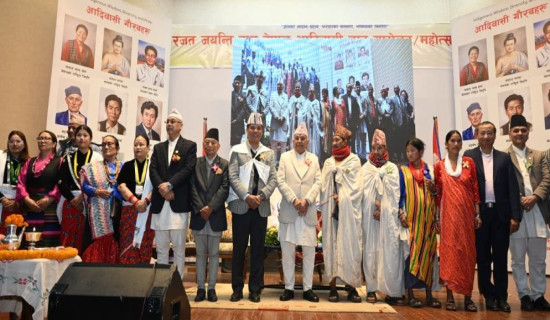- Monday, 9 February 2026
Growing plastic pollution calls for urgent action
Kathmandu, June 5: The extensive use of plastic bags and their haphazard disposal has raised growing concerns among environmentalists in the country.
Despite several control measures being implemented, doubts persist about their effective implementation and the release of plastic waste into the environment.
With the growing concern about plastic pollution that wrecks the world’s environment, this year’s World Environment Day, observed on June 5th, focuses on the theme “Beat Plastic Pollution,” reminding people that their actions on plastic pollution matter.
Despite being renowned for its original natural beauty, the country now deals with the adverse effects of plastic waste, which poses a significant threat to its ecosystems, wildlife, and public health, according to experts.
Speaking to The Rising Nepal, Tirtha Bahadur Shrestha, a senior scientist, stated that the rising population and pollution are the main reasons behind the world’s suffering. While there are many types of degradable pollutants , plastic is not degradable and is causing problems in the marine and land environments.
Rivers and streams that once flowed crystal clear are now suffocating under layers of discarded plastics. The Bagmati River, a lifeline for the Kathmandu Valley, has become a dumping ground for plastic waste, impeding its natural flow and polluting the water.
Shrestha said, “Plastic pollution is a recent issue. When Tenzing Norgay Sherpa and Sir Edmund Hillary scaled Mount Everest, they did not carry plastic bags or use any plastic items. However, these days, everybody carries plastic to the mountain, which pollutes it.”
Beautiful tourist destinations are now becoming polluted with plastic, and this issue needs to be controlled. Although there are laws regarding plastic control, they are not being implemented properly, he added.
Environmental activist Dr. Ngamindra Dahal emphasized that the main environmental crisis in the present context is quality control during civil construction.
Rapid urbanization, changing lifestyles, and inadequate waste management infrastructure have contributed to the spread of plastic pollution in Nepal. Plastic bags, bottles, and packaging materials have become pervasive, blockage waterways, contaminating soil, and cause harm to numerous species, he said.
“In our context, plastic pollution is the only environmental problem that does not contribute to climate change and global warming since Nepal’s annual per capita carbon emission is one of the lowest in the world at 0.29 tons as per 2020 data. Therefore, the environmental problem is a local problem and should be resolved locally,” Dr. Dahal said.
Plastic ingestion and entanglement have become common occurrences, leading to injuries and fatalities among animals. Vulnerable species like turtles, birds, and cows often mistake plastic items for food, causing internal blockages and slow, agonizing death.
The human population is not spared from the harmful impacts of plastic pollution either. Improper disposal and open burning of plastic waste release toxic pollutants into the air, posing serious health risks to communities, particularly those living near landfills and incineration sites, Shrestha said.
Recognising the urgency of the situation, the Nepal government, along with environmental organizations and concerned citizens, has initiated efforts to combat plastic pollution. The government published a public notice in the Nepal Gazette on July 16, 2021, regarding a complete ban on the production, distribution, and use of plastic bags that are less than 40 microns thick.
Earlier, on April 1, 2015, the government announced a ban on plastic bags that are smaller than 20x35 inches and thinner than 40 microns by publishing a notice in the Nepal Gazette. However, the Supreme Court issued an interim order to the government in August 2016, demanding a complete ban on the use of plastic bags with a thickness below 40 microns within three weeks, but the order went unimplemented.
Inadequate resources, lack of public awareness, and the presence of a thriving informal waste sector continue to hinder progress in this regard. Concerted efforts from all stakeholders, including government agencies, businesses, civil society, and individuals, are crucial to effectively tackle plastic pollution.








-square-thumb.jpg)








